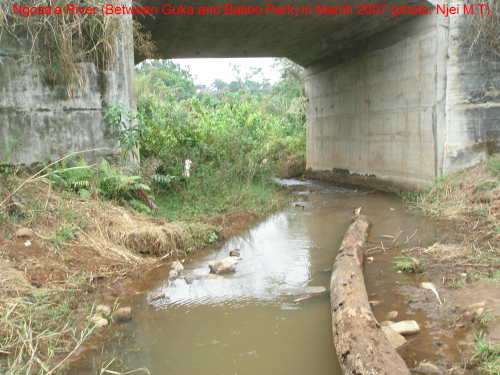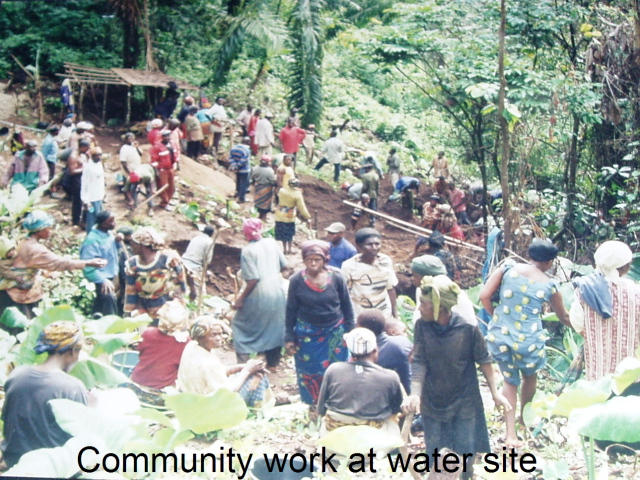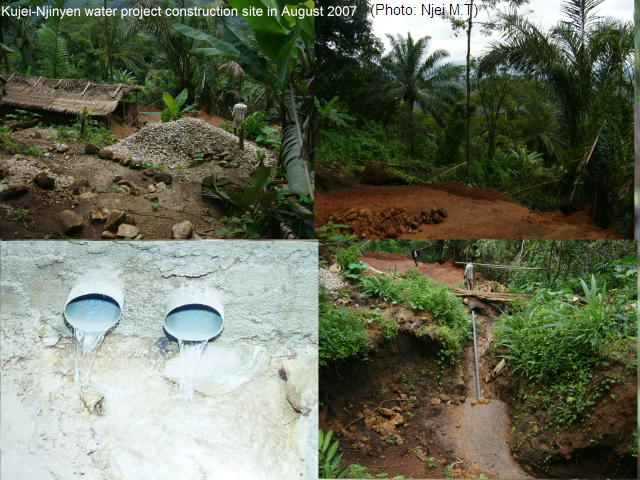One of the Community Water Projects in Batibo, Cameroon
9 Nov 2007
Water, especially drinking water is increasingly becoming a scarce commodity. Rural communities that had easy access to clean water from streams and springs a few decades ago are now facing unprecedented water shortages. Uncontrolled deforestation and climate change have taken a toll on the land and as such streams, rivers and other water sources are drying up at an alarming rate. The surviving bodies of water are usually polluted due to human activity and environmental degradation.

Drying & polluted Ngoza'a River: Has lost more than 90% of her volume of the seventies
I visited a rural community on the outskirts of the town of Batibo in the North West province of Cameroon to see how they are adapting to the evolving situation.
Cameroon’s National Water Supply Company (abbreviated SNEC in French) cannot meet up with demand for portable water in the community. SNEC’s water supply in Batibo municipality like in other parts of the country has been very erratic and the coverage by SNEC is limited to a few people. Faced with these difficulties, the people of Batibo are trying to build other sources of water to compliment that of SNEC.
Discussions have been held with some communities and the idea of building one of such projects near Njinyen has been embraced with enthusiasm. Aware that they cannot count on the government to expand water projects in the area, the villagers have opted to contribute money and mostly labour to help in the realization of the project. People from Bengang, Kokum, Tad, Kuneck, Kujei, Njinyen, Ewai and part of Mbunjei take turns to come and work on the site.

Villagers contributing their 'labour' to the project
The site is located near the top of a hill, almost three kilometers from the nearest point
that a car can reach. The villagers have to carry sand, cement and other building materials on their heads over long distances including a grueling climb to attain the construction site. According to information obtained from Afuh Philip (one of the leaders behind the project), it is envisaged that a tank with the capacity to store 100,000 litres of water will be constructed on the hill at ‘Tigdum’. The point of elevation of the tank will ensure that water will flow by gradient through the pipes to be connected to the end users. According to him, “studies have shown that at the peak of the rainy season the water point can produce between 300,000 and 400,000 litres of water per day and at the driest period of the year, it is capable of producing 42,000 litres per day”.
A Batibo based Spanish NGO-MPDL is helping in the construction of the tank while the Batibo Rural Council has assisted in providing a vehicle to transport building materials. Even with this input, more than 60% of the resources required to see the project through will depend on funds raised by the community especially those her elements resident outside Batibo. The amount required by the community to complete the project is estimated at around 30 million francs (about 60% of the total cost estimated at 50 million cfa (about $106,000).

Different phases of the project in August 2007 (photo: Njei M.T)
As I surveyed the construction site, I started asking myself what if in the future the water table drops or something happens and a landslide sweeps away the tank perching on the hill slope? That is my way of thinking but not that of the teaming hundreds of villagers that are labouring on the project site. They are upbeat and filled with optimism. When I raised these fears to one of them, he replied; “That is not possible”. That is the optimism that is the driving force behind what they have accomplished so far.
Njei Moses Timah
|